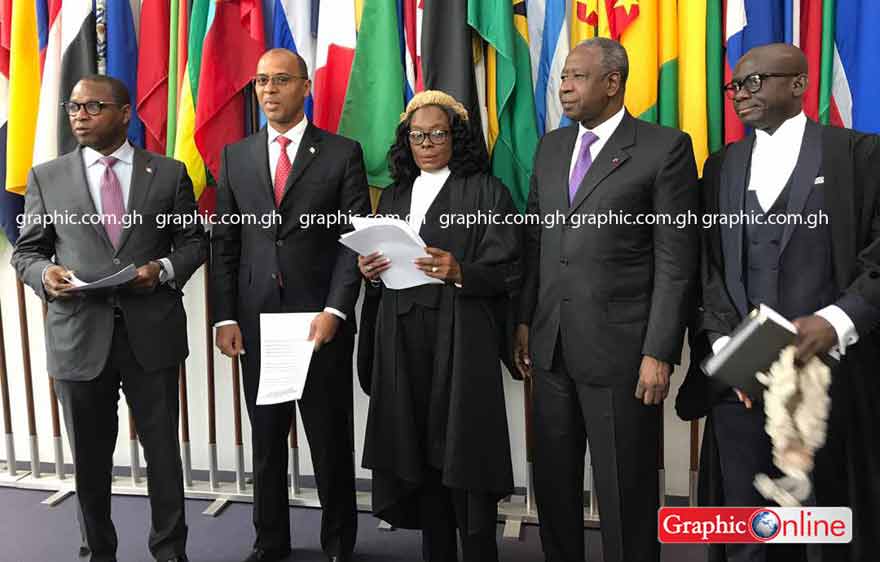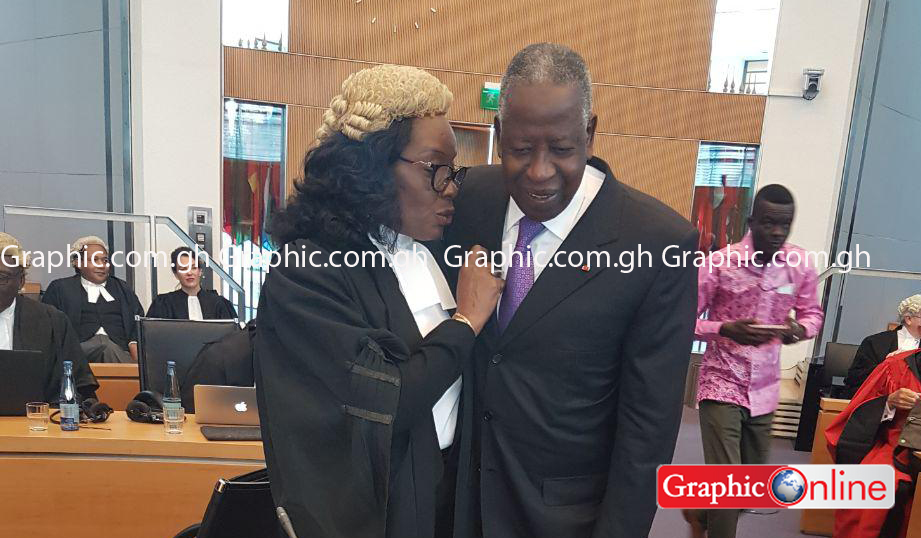
Ghana triumphs over maritime boundary dispute - Ghana triumphs over maritime boundary dispute
Article Index
Effect of decision
The team from Ghana, led by the Attorney-General and Minister of Justice, Ms Gloria Akuffo, was moderate in its jubilation.
Indeed, both countries, in a joint press conference, promised to abide by the decision of the tribunal.
As it stands now, the apprehension among investors with regard to the Tano Basin has been wiped off.
The judgement has, accordingly, given impetus to investment in Ghana’s oil and gas sector, as the country is now free to resume oil exploration activities in the Tano Basin.
Indeed, it is a major operator of the Tweneboah, Enyerra and Ntomme (TEN) fields.
Tullow
Tullow Oil has announced that it will restart drilling in the TEN fields by the end of 2017.
In a statement after the delivery of the judgement, Tullow said since the new maritime boundary, as determined by the tribunal, did not affect the TEN fields, as per the map, the company would continue to work with Ghana.
"Tullow will now work with the government of Ghana to put in place the necessary permits to allow the restart of development drilling in the TEN fields," it said.
"Tullow expects to resume drilling around the end of the year, which will allow production from the TEN fields to start to increase towards the floating, production, storage and offloading (FPSO) design capacity of 80,000 barrels of oil per day (bopd)," it added.
Ghana is also, per the decision of the tribunal, not financially obligated to Cote d’Ivoire in any manner.

Ghana’s international responsibility
The tribunal held: “It is a well-established rule of international law that a state which suffers damage as a result of an internationally wrongful act by another state is entitled to obtain reparation for the damage suffered from the state which committed the wrongful act.
“The reparation must, as far as possible, wipe out all the consequences of the illegal act and re-establish the situation which would, in all probability, have existed if that act had not been committed (Factory at Chorzów, Merits, Judgement No. 13, 1928, P.C.I.J., Series A, No. 17, p. 47).”
Touching on Cote d’Ivoire’s argument that Ghana owed it international responsibility with regard to reparation, the tribunal said the first step in deciding on a claim for Ghana’s international responsibility was to ascertain whether or not Ghana had violated international law.
In its final submissions, Côte d’Ivoire requested the Special Chamber “to declare and adjudge that the activities undertaken unilaterally by Ghana in the Ivorian maritime area constituted a violation of the exclusive sovereign rights of Côte d’Ivoire over its continental shelf, as delimited by this chamber”.
It further accused Ghana of engaging in extensive unilateral activities, both exploration and exploitation, in the disputed area and that the oil exploration activities conducted by Ghana in the majority of the blocks located entirely or partially in the disputed area consisted not only of seismic studies but also operations which were physically harmful to the continental shelf.
But, Ghana, in its final submissions, requested the Special Chamber to reject Côte d’Ivoire’s claim alleging violation of its sovereign rights.
Ghana described Côte d’Ivoire’s submission on the violation of sovereign rights as “unsupported by authority, principle or the evidence”.
Position of Special Chamber
The Special Chamber took into account Cote d’Ivoire’s shifting of positions with regard to the method to be adopted for delimitation.
“In February 2009, Côte d’Ivoire proposed a delimitation based on a meridian, but in May 2010, it proposed a different meridian.
“Additionally, in November 2011, Côte d’Ivoire changed its position and advocated the application of the angle bisector method,” the tribunal noted.
The line developed in 2011 was again modified in May 2014.
The application of those different methods of delimitation, the tribunal noted, resulted in the variation of disputed area’s location and size.
The Special Chamber agreed with the statements of the two parties that the sovereign rights, which coastal states enjoyed in respect of the continental shelves off their coasts, were exclusive in nature and that coastal states had an entitlement to the continental shelves concerned without the need to make a relevant declaration.
“However, the Special Chamber disagrees with both parties as to the meaning of a judgement on the delimitation of a continental shelf. The parties both consider such a judgement only to be of a declaratory nature but they disagree as to the consequences to be drawn from such a qualification.
“In the view of the Special Chamber, the consequence of the above is that maritime activities undertaken by a state in an area of the continental shelf which has been attributed to another state by an international judgement cannot be considered to be in violation of the sovereign rights of the latter if those activities were carried out before the judgement was delivered and if the area concerned was the subject of claims made in good faith by both states,” it said.
No violation
On the basis of the foregoing, it found the argument advanced by Côte d’Ivoire that the hydrocarbon activities carried out by Ghana in the disputed area constituted a violation of the sovereign rights of Côte d’Ivoire as not sustainable, “even assuming that some of those activities took place in areas attributed to Côte d’Ivoire by the present judgement”.
The Special Chamber, accordingly, held that “Ghana did not violate the sovereign rights of Côte d’Ivoire”.
As a consequence of the above, it considered it unnecessary to deal with Ghana’s argument that its hydrocarbon activities took place east of the "customary equidistance line" and, therefore, could not engage international responsibility and were consented to by Côte d’Ivoire, since the chamber had already established that that line had no legal relevance.
Violation of Article 83 of the convention
Turning to accusations that Ghana had violated Article 83 (1) of the UNCLOS, it held that the obligation under Article 83, Paragraph One of the convention to reach an agreement on delimitation necessarily entailed negotiations to that effect.
It said the obligation to negotiate in good faith occupied a prominent place in the convention, as well as in general international law and that that obligation was, particularly, relevant where neighbouring states conducted maritime activities in close proximity.
“The Special Chamber notes, however, that the obligation to negotiate in good faith is an obligation of conduct and not one of result. Therefore, a violation of this obligation cannot be based only upon the result expected by one side not being achieved,” it said.
The tribunal said negotiations took place between Ghana and Côte d’Ivoire over six years, with 10 meetings between 2008 and 2014.
It said those meetings all dealt with the issue of maritime delimitation, adding: “In the view of the Special Chamber, Côte d’Ivoire has not produced any convincing arguments that these negotiations were not meaningful. Agreement was reached at least on the exact location of the land boundary terminus (BP 55), for example. The fact that Ghana tried to preserve the status quo, as it saw it, is, in the view of the Special Chamber, not a violation of an obligation to negotiate in good faith.
“Equally, the fact that Ghana initially closed off the avenue for a judicial settlement is not contrary to the obligation to negotiate in good faith, as Côte d’Ivoire claims. Article 298 of the convention explicitly permits state parties to exclude certain disputes from compulsory procedures.
“In conclusion, the Special Chamber takes the view that Côte d’Ivoire has not convincingly substantiated that Ghana did not negotiate in good faith and, accordingly, dismisses its claim for international responsibility on the basis of a violation of Article 83, Paragraph One of the convention.”
.jpg)
Ghana complied with April 25, 2015 Order
Rejecting Cote d’Ivoire’s claim that Ghana violated the April 25, 2015 decision of the Special Chamber, which halted the drilling of new wells in the disputed area, the tribunal said it had taken note of the fact that Ghana finally suspended its activities by implementing its obligations in accordance with the order of the Special Chamber.
“Finally, the Special Chamber takes into account that Ghana has undertaken hydrocarbon activities only in an area attributed to it,” it held, and, accordingly, dismissed Cote d’Ivoire’s contrary claims.
It further concluded that pursuant to the order, no “new drilling” by Ghana or under its control had been carried out in the disputed area.
“As regards the provisional measure requiring the parties to pursue their cooperation, the Special Chamber notes that Ghana has contributed to cooperation on several occasions,” it opined.
It said it had taken note of bilateral meetings and correspondence between the two countries to arrive at the conclusion that “Ghana continued to cooperate and communicated to Côte d’Ivoire the information relating to the activities carried out in the disputed area, pursuant to the order”.
Conclusion on responsibility
“On the basis of the above considerations, the Special Chamber concludes that none of the activities of Ghana engages its international responsibility. Therefore, the Special Chamber considers that there is no need to address the question of reparation,” the tribunal held.
On the issue of delimitation of the continental shelf beyond 200NM, it said it had jurisdiction to delimit the continental shelf beyond 200NM between the parties.
“The Special Chamber can delimit the continental shelf beyond 200NM only if such a continental shelf exists. There is no doubt about this in the case before the Special Chamber,” it said.
Delimitation methodology
On the methodology for the delimitation of the continental shelf beyond 200NM, it rejected the bisector line method of delimitation and accepted Ghana’s equidistance method and rejected Cote d’Ivoire’s angle bisector line method.
Background
After 10 failed negotiation attempts, Ghana, in September 2014, announced it had instituted arbitration proceedings at the ITLOS to ensure the resolution of its maritime boundary dispute with Cote d’Ivoire.
In accordance with Article 3 (a) of Annex VII, Ghana appointed Judge Thomas Mensah, a former President of the ITLOS, as a member of the tribunal.
“Despite several years of good faith negotiations, including at least 10 rounds of bilateral meetings, Ghana and Cote d’Ivoire have been unable to agree upon the location of their maritime boundary,” then Attorney-General and Minister of Justice, Mrs Marietta Brew Appiah-Opong, announced at a press conference in Accra on September 23, 2014.
The first round of preliminary hearing began in March 2015, when Cote d’Ivoire prayed the tribunal to stop all activities in the disputed area, but Ghana led evidence to prove why activities in the disputed area could not be halted.
The tribunal, on April 25, 2015, refused to stop oil companies operating in the disputed area from operating. It, however, stopped the drilling of new wells until the final determination of the case.
Writer’s email: [email protected].